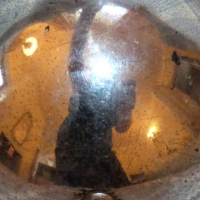We’d like to remind Forumites to please avoid political debate on the Forum.
This is to keep it a safe and useful space for MoneySaving discussions. Threads that are – or become – political in nature may be removed in line with the Forum’s rules. Thank you for your understanding.
PLEASE READ BEFORE POSTING
Hello Forumites! However well-intentioned, for the safety of other users we ask that you refrain from seeking or offering medical advice. This includes recommendations for medicines, procedures or over-the-counter remedies. Posts or threads found to be in breach of this rule will be removed.📨 Have you signed up to the Forum's new Email Digest yet? Get a selection of trending threads sent straight to your inbox daily, weekly or monthly!
The Forum now has a brand new text editor, adding a bunch of handy features to use when creating posts. Read more in our how-to guide
Preparedness for when
Comments
-
cinnamon is magic
 fab for your skin mar, I rub it on with olive oil and honey as a gentle face exfoliator. Works for me and free from me cupboard.
fab for your skin mar, I rub it on with olive oil and honey as a gentle face exfoliator. Works for me and free from me cupboard.
I love using ingredients for health and beauty. It's thought rosemary can help strokes and Alzheimer's as there's something in it (an acid if I recall) that helps protect from free radicals.
Rosemary for remembrance?
Aren't there different types of cinnamon? Ah yes, Google tells me there is Ceylon and Cassis. Ceylon being the more beneficial.
Turmeric is good too - it's an anti inflammatory and anti oxidant. I out it in soups and curries.
I am another trying to practice clean and paleo (ish) type eating. Paleo ish because I do eat pulses and have a little dairy so my food stores contain beans and lentils and peanut butter.I wanna be in the room where it happens0 -
Dementia is thought to be connected to inflammation so my guess is that the beneficial qualities of rosemary towards inflammation is why the connection is there.
Turmeric is anotherone I am watching. Its now in supplement form. I am intrigued by the properties of it but not made that step yet.
I'm eating paleo but with dairy and feel super for it.0 -
Scientists reported earlier this year that smelling rosemary oils improved short term memory, whilst smelling lavender reduced it..
Just a quick thought, going back to lurking. Anchor yourself to the foundations of everything you love.
Anchor yourself to the foundations of everything you love.
Thank you to all those who post competitions!:beer:0 -
Look at for information on Ayurvedic medicine Mar. There's lots of useful stuff about spices. Turmeric is one, but I also used to use chillies and garlic to help with chronic pain issues. I can't remember the details but there is lots of information out there. I've got a book somewhere (I think... I may have kondo'd it a while ago as I no longer need it... I just eat a LOT of curries and spicy food from habit now!).0
-
Mar, one easily available book is Grow Your Own Drugs, by James Wong - shows you how to prepare the herbs safely yourself. Sorry your health is acting up
 I went to a Chronic Fatigue Management seminar last week, and it had a few helpful bits, but like you, there isn't a huge amount of help around. 2023: the year I get to buy a car0
I went to a Chronic Fatigue Management seminar last week, and it had a few helpful bits, but like you, there isn't a huge amount of help around. 2023: the year I get to buy a car0 -
This goes up to 60m http://flood.firetree.net even more scary.
I wonder if the rise in water, being a permanent thing, would create beaches or sand banks in the new coastal areas.0 -
I wonder if the rise in water, being a permanent thing, would create beaches or sand banks in the new coastal areas.
 It's interesting, isn't it? We tend to think that the way things are now is the way they were alway, and the way they will be.
It's interesting, isn't it? We tend to think that the way things are now is the way they were alway, and the way they will be.
The North Sea used to be low-lying land until permanantly inundated, believed to be after a tsunami. The Thames was once a tributary of the Rhine, if memory serves. Rising sea levels would impact on rivers, in terms of their courses and where they met the sea. Silt would cause changes to the topography inc probably mudbanks and marshes, and perhaps delta formation. These changes wouldn't be a one act deal, they would be progressive, as levels changed or just through the passage of time. Land isn't static.
How would sea life react to changing depths of water, with changing salinity and temperature? Would there be more or less plankton, the building block of the marine food chain? Would there be plenty of fish, different fish, dieback of saltwater fish and extension of the ranges of freshwater species into what is now salt water?
If we had a spare planet to play with, this would be a fascinating project. As is, it's still fascinating but absolutely terrifying, too.Every increased possession loads us with a new weariness.
John Ruskin
Veni, vidi, eradici
(I came, I saw, I kondo'd)
0 -
 It's interesting, isn't it? We tend to think that the way things are now is the way they were alway, and the way they will be.
It's interesting, isn't it? We tend to think that the way things are now is the way they were alway, and the way they will be.
The North Sea used to be low-lying land until permanantly inundated, believed to be after a tsunami. The Thames was once a tributary of the Rhine, if memory serves. Rising sea levels would impact on rivers, in terms of their courses and where they met the sea. Silt would cause changes to the topography inc probably mudbanks and marshes, and perhaps delta formation. These changes wouldn't be a one act deal, they would be progressive, as levels changed or just through the passage of time. Land isn't static.
How would sea life react to changing depths of water, with changing salinity and temperature? Would there be more or less plankton, the building block of the marine food chain? Would there be plenty of fish, different fish, dieback of saltwater fish and extension of the ranges of freshwater species into what is now salt water?
If we had a spare planet to play with, this would be a fascinating project. As is, it's still fascinating but absolutely terrifying, too.
There's an emerging school of thought round here that our 18-mile Chesil Bank (or beach) may have actually formed very swiftly, and could disappear equally quickly if certain factors coincided. None of these factors are individually unlikely, it's just that they don't usually all happen at once. But that doesn't mean that they can't... which would leave a long stretch of our chalky coastline absolutely open to rapid erosion, as that area faces into the prevailing winds and currents. Things like this have happened many times before, both gradually like the Solent & Poole Harbour gradually filling, and rapidly like the flooding of the North Sea; there are drowned prehistoric villages down there and presumably their inhabitants were taken by surprise.
We do take our apparently-stable landscape for granted, yet I believe there was a fairly massive earthquake in the late 1200s that was felt clear across the UK and parts of Northern Europe, and killed a fair number of people in Southern England. It's likely the epicentre was somewhere near Portsmouth or Chichester. We all know that there are little quakes from time to time in the UK; I've even "seen" one making a hanging string dance in the middle of the night, but a real quake is just outside our frame of reference. Obviously they don't happen very often but - they can happen. Who knew?! :eek:Angie - GC Feb 26 £335.07.07/£400: 2025 Fashion on the Ration Challenge: 40/68: (Money's just a substitute for time & talent...)0 -
I wonder when we last had an earthquake I thought to myself. After a quick Google I stumbled on this
http://http://www.earthquakes.bgs.ac.uk/earthquakes/recent_uk_events.html
Who knew? Not me, anyway.'Yaze whit yeh hive an ye'll niver wahnt'
(From Mae Stewart's book 'Dae Yeh Mind Thon Time?')0
This discussion has been closed.
Confirm your email address to Create Threads and Reply

Categories
- All Categories
- 353.5K Banking & Borrowing
- 254.2K Reduce Debt & Boost Income
- 455.1K Spending & Discounts
- 246.6K Work, Benefits & Business
- 603K Mortgages, Homes & Bills
- 178.1K Life & Family
- 260.6K Travel & Transport
- 1.5M Hobbies & Leisure
- 16K Discuss & Feedback
- 37.7K Read-Only Boards








